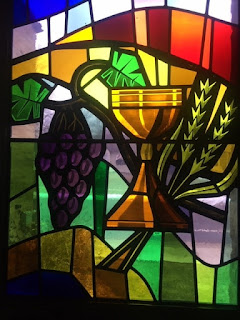What kind of King comes at Christmas? Luke 23:33-43
Is this a good time to start talking about Christmas?
 I know Christmas is still 30 something days away--but maybe, as some folks have decorations up, its helpful to hear the Good News that Christmas is a story of God coming to meet us, to love us, to heal us, and above all to be the king who would die for us. It's good to hear the story and know that Jesus comes to meet the deepest longing of our souls. Long before Jesus' birth Jeremiah wrote about a new branch coming from a great old king's family tree. These ancient words of hope were heard by people living in a time, that like ours, can seem empty of good news and hope. Jeremiah wrote,
I know Christmas is still 30 something days away--but maybe, as some folks have decorations up, its helpful to hear the Good News that Christmas is a story of God coming to meet us, to love us, to heal us, and above all to be the king who would die for us. It's good to hear the story and know that Jesus comes to meet the deepest longing of our souls. Long before Jesus' birth Jeremiah wrote about a new branch coming from a great old king's family tree. These ancient words of hope were heard by people living in a time, that like ours, can seem empty of good news and hope. Jeremiah wrote,
5 The days are surely coming, says the Lord, when I will raise up for David a righteous Branch, and he shall reign as king and deal wisely, and shall execute justice and righteousness in the land. 6 In his days Judah will be saved and Israel will live in safety. And this is the name by which he will be called: “The Lord is our righteousness.” Jeremiah 23:5-6 (NRSV)When Jesus was born angels celebrated his birth. Jesus, in his body, brought heaven to earth. Jesus' life, the teaching and the miracles, fulfilled old promises from prophets of long ago. God's kingdom was breaking through.
But,
the story had twists, turns, and a cross. Luke wrote of what looked like Jesus' final day. The story flipped over in one fateful night. Jesus' friends left him as he was arrested. It happened fast. Armed guards bound him. They lead him away. The religious authorities accused Jesus of blasphemy. They punched and slapped him before handing over to the Roman Army who beat him again. Those in power gave orders that he be nailed to a cross.
Hanging on a cross was the opposite of what Jesus' followers had expected. He was their hope--their future king. They wanted him to make things right. A day before they looked at him and saw hope in flesh and blood. And now Jesus, this man of hope, hung on a cross. And in this time and space between death and life old questions about Jesus were spoken out loud. Was Jesus the king they had been waiting for or was he just a fraud?
The soldiers also mocked him, coming up and offering him sour wine, 37 and saying, “If you are the King of the Jews, save yourself!” 38 There was also an inscription over him, “This is the King of the Jews.” Luke 22:36-43 NRSVJesus are you king? So many had hope he would be their king. And as he was dying the two people who were crucified with him started to speak. One man mocked him--but the other had hope--somehow he saw in Jesus the king he was waiting to meet.
39 One of the criminals who were hanged there kept deridingi him and saying, “Are you not the Messiah? Save yourself and us!” 40 But the other rebuked him, saying, “Do you not fear God, since you are under the same sentence of condemnation? 41 And we indeed have been condemned justly, for we are getting what we deserve for our deeds, but this man has done nothing wrong.” 42 Then he said, “Jesus, remember me when you come into your kingdom.” 43 He replied, “Truly I tell you, today you will be with me in Paradise.” Luke 22:39-43.His friends were gone--but one man still believed Jesus was a king and that he had a coming kingdom. That man--that criminal turned believer was hanging on a cross. He was dying in the same time and the same place as Jesus and in that moment he said remember me when you come into your kingdom. In that space between his own death and life he called out to Jesus. Jesus doesn't save us from our crosses--he doesn't save us from our deaths. He saves us on our crosses--he saves us in our deaths. Resurrection only happens after the worst has come. New life in Christ isn't about unicorns and rainbows. New life in Christ is about death being broken, it's about sin being conquered, it's about evil in all it's shapes and forms being broken. And the one who will break the power of sin, death, and the devil breaks their power by dying only to rise again.
So as we get ready for Christmas it's a good idea to remember the kind of king who is coming--the kind of king who will die to set us free. AMEN.
Peace,
and thanks for reading,
John







